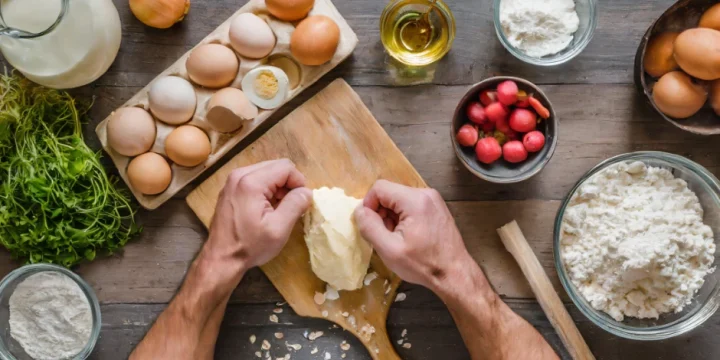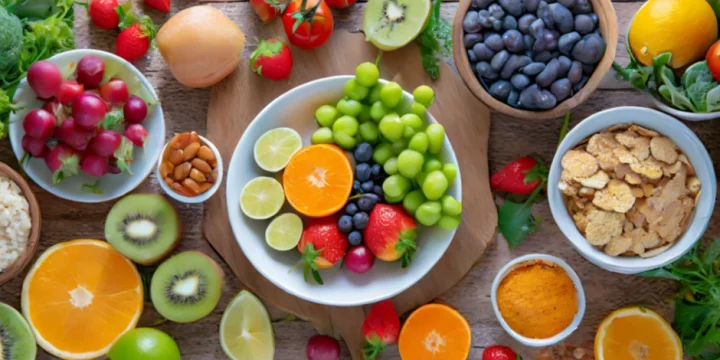Part of my job as an athletic trainer is to give nutrition tips to my clients on what to eat before starting any workout.
Knowing that high-intensity interval training requires a lot of effort, I spent a few weeks researching the most nutritious pre-workout foods that fit in this context.
I also consulted a dietician to see if these foods could provide complete nutrients to support this fast-paced exercise.
Read on to find out what you can eat to perform HIIT successfully.
Quick Summary
- Consuming meals like whole wheat toast with peanut butter, eggs, and baked sweet potatoes before a HIIT workout enhances energy levels and muscle strength.
- Eating a healthy meal one to two hours before a HIIT workout is advised to boost energy levels and prevent muscle loss.
- Oleic acid in peanut butter has been shown to improve cardiovascular health, according to WebMed research.
- In my opinion, including a variety of foods in pre-workout meals not only fuels the body but also caters to different dietary preferences and nutritional needs.
8 Pre-Workout Meals to Boost HIIT Workouts

From my experience as a fitness trainer, I've found that these eight pre-workout meals are particularly effective for clients who engage in HIIT workouts.
1. Whole Wheat Toast With Peanut Butter
A peanut butter sandwich on whole-wheat bread is one of the recommended pre-workout snacks that can provide a good source of protein, complex carbohydrates, fat, and dietary fiber.
Also, it has oleic acid, which has been shown in a research in WebMed to improve cardiovascular health, and several energy-giving micronutrients such as B vitamins, iron, and folate [1].
Eating this nutrient-dense pre-workout snack can help you increase your energy and muscle strength, allowing you to meet the demands of HIIT.
2. Baked Sweet Potatoes and Beans
Sweet potatoes with beans are high in complex carbs, fiber, protein, and micronutrients like potassium, calcium, and magnesium.
Because potatoes are naturally low in protein, adding beans can supply the amino acid isoleucine, which, according to the National Institute of Health (NIH), aids metabolism and energy regulation [2].
Having sweet potato and bean casserole with cheese before your high-intensity workout can help you get the complete nutrition you need for a long HIIT session.
3. Whole Grain Bread With Scrambled Eggs
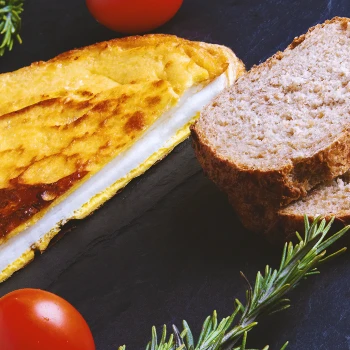
I often recommend whole grain bread with scrambled eggs to my clients. This meal provides complex carbohydrates, protein, and essential micronutrients like selenium, magnesium, and iron.
Scrambling the eggs in a healthy fat like olive oil not only enhances their flavor but also boosts their nutritional value with healthy omega-9 fats and antioxidants.
Consuming this pre-workout meal combination before HIIT might help boost your immune system, improve blood flow, and reduce inflammation.
4. Boiled Potatoes and Hard-Boiled Egg
Boiled potatoes and hard-boiled eggs are excellent sources of carbohydrates, proteins, essential vitamins, and minerals.
And because they are cooked by boiling, they contain less fat. Also, according to WebMed, cooking potatoes with their skins has been shown to retain their nutrients [3].
Eating boiled potatoes and eggs before a workout can help power up your body while taking better care of your heart.
5. Low-Fat Greek Yogurt, Fruits, Nuts, and Seeds
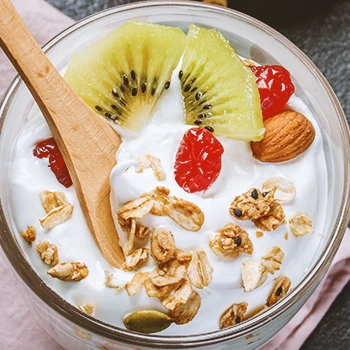
The combination of Greek yogurt, ripe berries, almonds, and ground flax seeds makes for a complete meal that includes healthy fats, carbs, protein, and vital micronutrients.
Choosing low-fat Greek yogurt and almonds can help protect your heart, while berries and flax seeds can provide stamina to your body.
Having a bowl of this mixture can energize you and properly fuel your whole body, allowing you to train longer.
6. Brown Rice and Lean Chicken Meat
One-pot rice and chicken dish is a healthy option for those who want to combine healthy carbs and protein in one meal.
But this dish can be more nutritious and heart-friendly by using brown rice, lean chicken meat without the skin, and chopped veggies like carrots, peas, and corn kernels.
Thus, eating a small plate of this meal an hour or two before your HIIT session can provide you with long-lasting energy and quick muscle repair.
7. Banana Whey Protein Shake
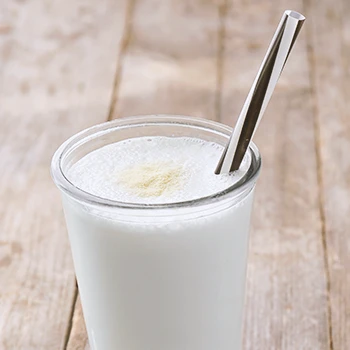
In my role as a fitness trainer, I often suggest banana-whey protein smoothies, especially as a post-workout meal for those doing HIIT workouts.
These smoothies are a great source of simple carbohydrates and proteins, which are crucial macronutrients for such intense exercises.
A typical smoothie made with a banana and two scoops of whey protein powder contains approximately 2 g of fat, 4 g of carbs, and 32 g of protein.
This combination offers quick energy without significantly spiking blood sugar levels, while also providing essential amino acids that are beneficial for muscle gain.
Related: Is a Banana Good Before a Workout?
8. Whole Wheat Pasta, Leafy Vegetables, and Lean Chicken Meat
A meal of whole wheat pasta, dark leafy greens, and lean chicken meat is a good source of carbohydrates, vitamins, minerals, and protein.
According to research by NIH, green leafy vegetables are high in iron, nitrate, and folate, which are all essential for mind and body functions [4].
Eating whole wheat pasta before workout with leafy greens and lean proteins can help your body get the energy and strength it needs for your high-intensity workouts.
Role of Prebiotics and Probiotics
Eating prebiotics and probiotics before workouts can improve digestion and gut health, boosting your performance in High-Intensity Interval Training (HIIT).
Prebiotics, like fiber-rich foods, feed good gut bacteria, while probiotics, in fermented foods or supplements, add more of these helpful microbes.
This combo not only helps with nutrient absorption and lessens stomach issues during exercise but also ramps up your energy metabolism and immune health.
So, including them in your pre-workouts can enhance endurance and recovery in intense workouts.
Can Eating Before HIIT Have Other Health Benefits?
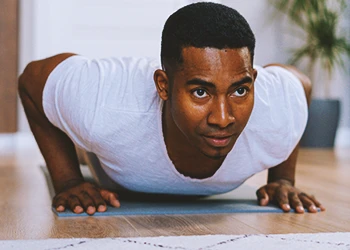
As a fitness trainer, I emphasize to my clients the importance of eating nutritious foods before engaging in HIIT workouts. This practice not only helps in maintaining energy stores but also plays a crucial role in preventing muscle loss.
By supplying your body with carbohydrates, you're not depleting but rather replenishing glycogen stores, which are essential for your body's performance in your next workout session.
“A light amount of food will help you get through the workout session more comfortably and with more energy.”
- Douglas Paddon-Jones, Professor, University of Texas
Furthermore, according to NIH, supplying your muscles with essential amino acids can help you retain lean muscles and stimulate the production of new muscle tissue fibers [5].
Are There Risks?
I advise my clients to be aware of the risks associated with eating before HIIT workouts. These risks include an increased chance of experiencing an upset stomach, bloating, and low energy levels.
It's crucial to wait a few hours after a meal before beginning your workout. Also, it's important to avoid foods that are heavy on the stomach. Additionally, drinking plenty of fluids before exercising can help mitigate these risks.
In fact, according to NIH, increasing your overall water intake is not only beneficial for avoiding these issues but can also enhance your workout results [6].
FAQs
Is It Good to Do HIIT on an Empty Stomach?
It might not be a good idea to do HIIT on an empty stomach because your body needs the energy to keep up with the high demands of this workout. Also, eating before exercising can help your body perform and hasten the post-workout recovery process.
When Should You Eat Before HIIT?
You should eat one to two hours before beginning your HIIT routine to give your body time to digest your meal.
It can help you avoid bloating, stomach cramps, and indigestion, which are common problems that impede weight loss efforts.
References:
- https://www.webmd.com/diet/peanut-butter-good-for-you
- https://www.ncbi.nlm.nih.gov/pmc/articles/PMC3654977/
- https://www.webmd.com/diet/health-benefits-potatoes
- https://pubmed.ncbi.nlm.nih.gov/29263222/
- https://www.ncbi.nlm.nih.gov/pmc/articles/PMC7019684/
- https://www.ncbi.nlm.nih.gov/pmc/articles/PMC8336541/
About The Author
You May Also Like




